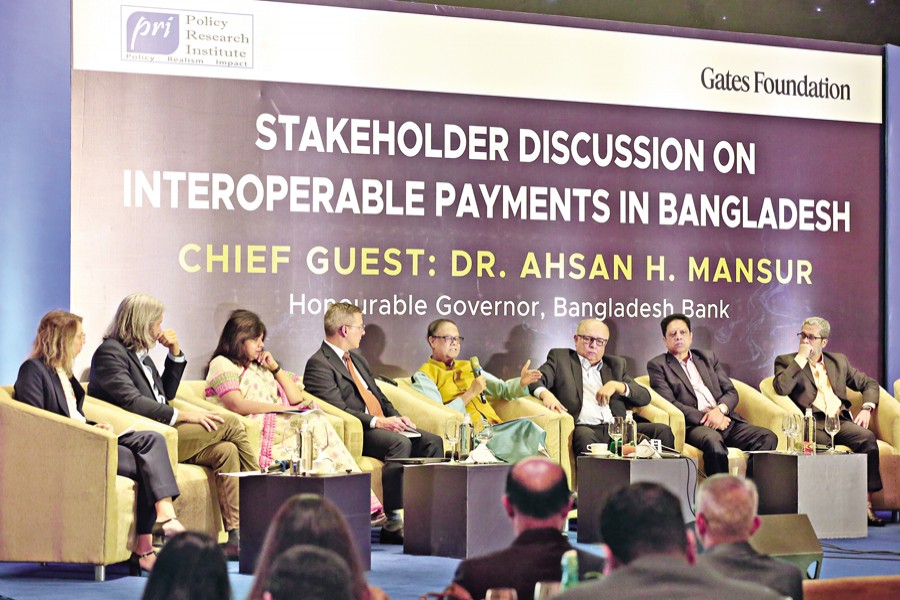
Published :
Updated :

A cover-all interoperable instant payment system (IIPS) comes soon as experts Monday suggested its immediate introduction to accelerate Bangladesh's transition towards a cashless society and the central-bank governor agreed.
They said digital IIPS infrastructure is crucial to ensuring efficiency, inclusiveness and reducing transaction costs, thus accelerating economic growth.
The recommendations came from a daylong stakeholder consultation on Interoperable Payments in Bangladesh, organised by the Policy Research Institute of Bangladesh (PRI) at a hotel in the capital and supported by the Gates Foundation. Speaking as chief guest, Dr Ahsan H Mansur, Governor of Bangladesh Bank, committed to launching a comprehensive IIPS that covers all segments of the economy-from rickshaw-pullers to small-shop owners-ensuring that no one is left behind in the digital transformation.
He unveiled a plan for rapid spread of QR codes and said the central bank earlier issued a letter to the Local Government Division not to issue trade licences to business entities without a QR-code system.
The Governor notes that Bangladesh has made significant progress in financial inclusion, but still around 35-40 per cent of the population remains excluded.
"Even those covered often lack meaningful engagement with the financial system."
He observes that despite the rapid growth of mobile wallets like bKash and Nagad, and the expansion of agent banking, cash demand is still rising at 10 per cent annually, costing banks an estimated Tk 200 billion in cash management each year.
"We must break this cycle. A unified national payment system will reduce inefficiencies, limit corruption and increase transparency," he told the meet.
The chief of the banking regulator hopes corruption and illegal transactions will decline significantly once digital platforms dominate.
Dr Mansur also emphasised the need for banks to engage more female agents in rural areas to deepen outreach.
"We are encouraging at least 50 per cent of new agent-banking appointments to be women, as they can access households and empower families in ways male agents cannot."
In his remarks, Dr Khurshid Alam, Executive Director of PRI, said nearly half the population-about 47 per cent-still lacked access to formal financial services.
"Fragmentation across banks, MFS providers and fintechs continues to create barriers. We remain a cash-dominated economy, which limits transparency, drives inefficiencies and holds back broader inclusion," he noted.
He terms building an inclusive instant-payment system not only a technological necessity but also a governance challenge and development imperative.
BB Deputy Governor Md Zakir Hossain Chowdhury told the meet that fintech companies are playing an increasingly important role in retail payments.
However, he points out that the ecosystem is still fragmented, with participants operating in silos and limited interoperability.
"To serve millions of unbanked and underbanked people it is urgent to introduce an innovative ecosystem that connects all players," he said.
Jason Lamb, Deputy Director at the Gates Foundation, noted that inclusive financial systems are the key to accelerating growth in other sectors such as health, agriculture and education.
Citing McKinsey research, Jason Lamb said full financial inclusion could boost Bangladesh's GDP by 5-10 per cent annually.
Snigdha Ali, Country Lead of Gates Foundation Bangladesh, said Bangladesh already has a US$3.5-billion digital economy, 146 million MFS customers with 90 million active users, a robust national digital ID, and a supportive policy environment.
"These factors position Bangladesh with significant potential to become a global example of inclusive finance," she observes.
Steven Martin Haley, Director of Market Development at the Mojaloop Foundation, told the audience that interoperable payment systems are not just charitable initiatives but drivers of economic growth.
Mojaloop, he explains, provides an open-source, low-cost platform designed to enable account-to-account transfers across banks, wallets, microfinance institutions and agents.
He points out that Bangladesh has the technical expertise to become a hub for Mojaloop innovation, noting ongoing training under the Bangladesh Accelerator Programme.
jahid.rn@gmail.com


 For all latest news, follow The Financial Express Google News channel.
For all latest news, follow The Financial Express Google News channel.